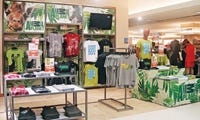By its very nature licensing is a follower not a leader. More often than not, you start with a brand and when it reaches a certain point in its lifecycle, the brand owner chooses to extend it by licensing its use to a third
April 6, 2018

By its very nature licensing is a follower not a leader. More often than not, you start with a brand and when it reaches a certain point in its lifecycle, the brand owner chooses to extend it by licensing its use to a third party. But two interesting case studies from Europe point to a new, more courageous relationship with retail where brands and characters take a strategic lead. 
The first example is the ambitious plan by Discovery Enterprises International, based in London, to create shops and retail destinations for its Discovery Expeditions brand. It has created a retail blueprint for a variety of formats that can be licensed to operators in different territories, with the first retail outlets likely to open in China and Europe. As well as stocking lifestyle product (gadgets and gear), the shops will offer the consumer the chance to experience the Discovery Expeditions brand through activations such as Discovery content delivered within the retail space, and the opportunity to network online with other explorers. It's an ambitious plan to set out the retail execution for a brand and then fill it with branded product. It will also be tailored to the maturity of different retail markets–with pop up shops most likely to appear in Europe, for example.
The second example is that of Warner Bros. Consumer Products, which will give License! Global an exclusive look at its direct-to-retail strategy for Europe in this issue.
WBCP is well poised to work with retailers as private labels increase their dominance, particularly in the grocery sector. Grocers want to work with brands that are well known across territories and generations, that can be interpreted with depth and strong stories and that come with strong licensor support for the brand both in and out of the store. It's a cocktail that has led to one of the biggest DTR food ranges in Europe–Looney Tunes Active at France's Systeme U. As WBCP's Stephane Fillastre will explain, it's also a cocktail that can work on a smaller scale and, if well executed, as a marketing initiative to set an example and raise a brand profile. 
DTR is the mechanism by which brand owners are most likely to compete in the future with private label and the arrangement can also be a powerful tool for retailers wanting to create difference. In a February report by Planet Retail ("Direct to Retail Brand Licensing–Opportunities for the Growth of Private Label Products") the message is that licensors of every scale can take advantage of the direct-to-retail opportunity. DTR can also be vital in emerging markets where the development of DTR is growing particularly fast.
The backdrop to all this is fierce competition created, sluggish retail performance and (particularly in the U.K.) the erosion of the traditional high street. Mothercare and Early Learning Centre, for example, are said to be considering leaving the high street altogether. It's left to Tesco's chief executive to say that innovation is the key. In response to recent sales announcements, CEO Phil Clarke said he would step up innovation and marketing to address a general merchandise offering grown "stale" and a clothing range that was not "on song" or "of the moment." A deeper and more meaningful relationship with brands, particularly in the kids' categories, could be a useful string to his and others' bows.
You May Also Like






